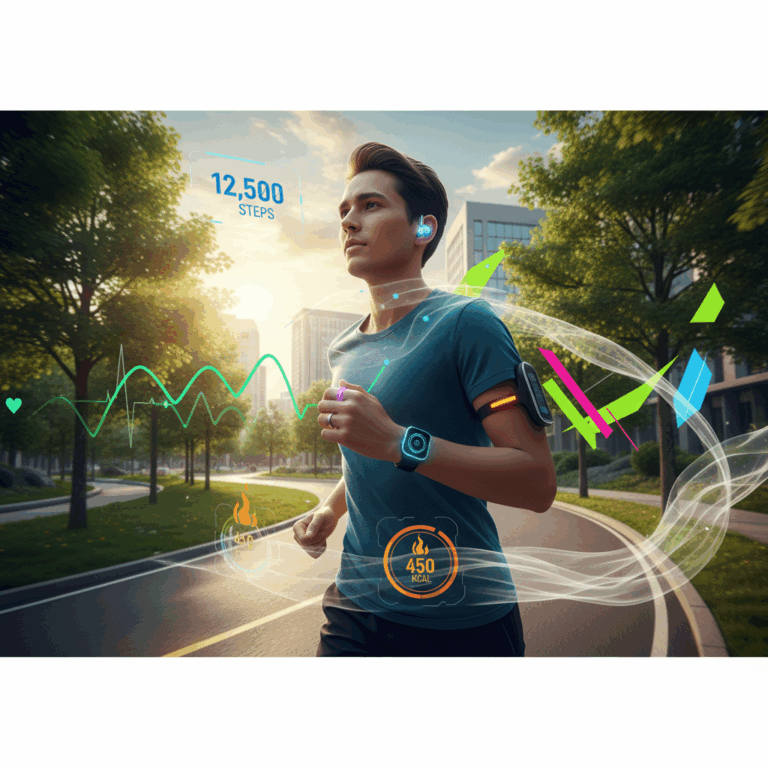Types of Wearable Tech Gadgets
Wearable technology has evolved to offer a variety of devices tailored to different health and fitness needs. These gadgets combine style, functionality, and advanced tracking capabilities.
Users can now choose from smartwatches and fitness rings, each providing unique benefits, from detailed activity tracking to discreet wellness monitoring.
As these devices become smarter with AI, they enhance daily health management, making fitness and connectivity more accessible than ever.
Smartwatches for Fitness and Connectivity
Smartwatches are the leading wearable gadgets, blending fitness tracking and smart features seamlessly. They monitor heart rate, sleep, and workouts with precision.
Top brands like Apple and Samsung offer models that also deliver notifications, music control, and contactless payments for everyday convenience.
Advanced AI in smartwatches personalizes coaching and health assessments, turning them into proactive companions for improved wellness.
Fitness Rings for Discreet Health Monitoring
Fitness rings provide a minimalistic option for users seeking subtle devices without missing key health insights. They track sleep quality, stress, and basic activity.
These compact rings are stylish and lightweight, ideal for continuous wear while offering readiness metrics to gauge overall wellness.
Perfect for those who prefer less obtrusive tech, fitness rings combine convenience with effective health monitoring in a sleek design.
Innovations in Wearable Technology
The field of wearable technology continues to advance with remarkable innovations that enhance user experience and health outcomes. AI-powered features and immersive displays are transforming how we interact with these devices.
New wearables now focus on personalized coaching, augmented reality applications, and comprehensive health insights, pushing the boundaries beyond simple tracking.
These breakthroughs make smart wearables indispensable tools for fitness, medical support, and lifestyle improvements in daily life.
Advanced AI Integration and Personalized Coaching
AI integration in wearables has evolved to offer highly personalized health coaching and real-time feedback. This transforms simple trackers into smart health assistants.
Users benefit from customized workout plans, health scoring, and virtual guidance tailored to their individual goals and conditions, improving engagement and results.
Such intelligent wearables analyze diverse data streams to provide actionable insights, helping users make informed lifestyle choices.
As algorithms improve, these devices become proactive partners in achieving optimal health through continuous adaptation.
Head-Mounted Displays and AR Glasses
Head-mounted displays (HMDs) and AR glasses are emerging as revolutionary wearables with applications in both healthcare and workplace environments. They enable immersive, hands-free information access.
For medical users, AR glasses assist neurological patients by delivering guided physiotherapy and movement support, enhancing rehabilitation outcomes.
In professional settings, these devices improve safety and training by overlaying critical data and hazards, fostering more efficient workflows.
This technology blends digital content with reality, opening new avenues for interaction and assistance beyond traditional screens.
Holistic Health Insights and Predictive Analytics
Wearables now provide holistic health monitoring that includes nutrition, hydration, and mental wellness, going beyond physical activity tracking to overall lifestyle support.
Predictive analytics use complex data models to identify early warning signs of health issues, enabling preventive measures before symptoms arise.
This comprehensive approach empowers users with deeper knowledge about their body and promotes sustained well-being through informed decisions.
Impact on Future Healthcare
By integrating multi-dimensional data, wearables hold the potential to transform healthcare from reactive to proactive, reducing costs and improving quality of life.
Applications in Health and Lifestyle
Wearable technology in health and lifestyle is revolutionizing how individuals manage their well-being. Devices now offer therapeutic support and enhance daily living for many.
From aiding neurological rehabilitation to improving workplace safety, these wearables blend innovation and practical benefits to transform health management.
The integration of AI and real-time feedback in wearables empowers users to take active control over their health and lifestyle choices effectively.
Digital Therapeutics and Neurological Condition Support
Wearables equipped with augmented reality and AI provide critical support for neurological conditions like Parkinson’s disease. They guide users through therapeutic exercises with precision.
These devices offer personalized interventions, assisting mobility and symptom management by delivering real-time feedback and progress tracking.
This technology enhances traditional treatment by improving patient engagement and delivering targeted therapy outside clinical settings, increasing independence.
Workplace Safety and Training Enhancements
AR glasses and head-mounted displays improve workplace safety by providing hands-free access to safety instructions and hazard alerts, reducing accident risks.
Wearables facilitate immersive training sessions, enabling workers to learn procedures in real-time while performing tasks, which increases retention and proficiency.
Employers benefit from these technologies by promoting safer environments and optimizing workforce training, ultimately enhancing productivity and reducing downtime.
Trends and Future Directions
Wearable technology in 2025 is rapidly evolving with increased connectivity and AI-driven features that create smarter, more intuitive devices. These advancements enhance user experiences and health management.
The integration of wearables into everyday life is becoming seamless, making them indispensable companions for wellness and productivity across diverse environments.
As technology progresses, wearables are expected to embed even more deeply into daily routines, offering personalized, real-time insights and support.
Increased Connectivity and AI-Enabled Features
Connectivity improvements allow wearables to sync effortlessly with smartphones, cloud services, and other IoT devices, facilitating continuous data sharing and analysis.
AI-enabled functions now deliver proactive health coaching, early anomaly detection, and virtual assistant support, turning wearables into active health partners.
This enhanced intelligence enables multi-dimensional monitoring, adjusting recommendations based on real-time data and predictive analytics for better outcomes.
Integration of Wearables into Daily Life
Wearables are no longer standalone gadgets; they blend into users’ routines by offering hands-free notifications, contactless payments, and environmental sensing to enhance convenience.
From smartwatches to AR glasses, these devices support work, fitness, and health seamlessly, promoting a holistic approach to lifestyle management.
Future trends suggest deeper personalization and adaptive technologies that learn users’ habits, making wearables intuitive extensions of the self.







